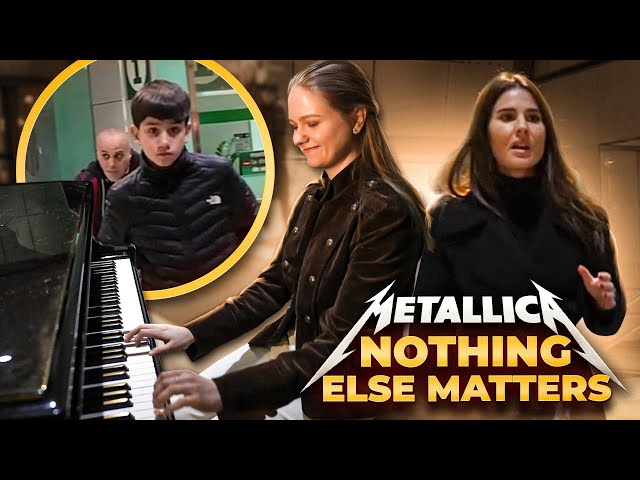A SINGER Joins Me in the Hospital While I Play a METALLICA Song 😱
Hospitals aren’t usually places associated with music, especially not the raw energy of a Metallica song. But sometimes, life throws us a powerful, unexpected moment—one that breaks the silence, cuts through the pain, and lifts the human spirit in ways no medicine ever could. That’s exactly what happened when I found myself at a hospital piano, pouring my emotions into the keys with Metallica’s haunting ballad, and out of nowhere, a singer joined me. It was spontaneous. It was electrifying. It was healing. And it was unforgettable.
Let’s set the scene.
I was admitted to the hospital for reasons I won’t dive deeply into here—just know that it was a challenging time, physically and emotionally. The sterile walls, the beeping monitors, the general weight of uncertainty can feel suffocating. But tucked in the corner of the rehabilitation wing was an upright piano. Simple, unassuming, probably donated years ago—but to me, it looked like a lifeline.
Music has always been my outlet. And on this particular afternoon, as the golden light filtered through the large hospital windows, I sat down and began to play “Nothing Else Matters” by Metallica. It’s a song that speaks to pain, trust, isolation, and connection—all themes I was living in real time. The slow, deliberate intro carried into the room like a whisper, drawing attention from nearby patients and staff.
I didn’t notice anyone else at first. I was too deep in the music, letting my fingers do what they’d always done—speak when my voice couldn’t.
Then, a voice joined in.
Soft at first. A perfect match to James Hetfield’s somber tone, yet uniquely its own—rich, soulful, full of raw emotion. The voice rose as the chorus approached, resonating in the echoing hallway. For a moment, I didn’t even look up. I thought maybe it was a recording or someone singing from far away. But no, the voice was right beside me.
I finally turned and saw a young woman standing there. She was wearing casual clothes, a visitor’s badge dangling from her neck, and a spark in her eye that said she loved music as much as I did. She wasn’t just singing—she was feeling every word.
As we played together—me on the piano, her with her voice—something shifted in the room. Nurses paused their rounds. Patients rolled to their doors in wheelchairs. A few even wept silently. It wasn’t just a song. It was healing.
The moment grew, and we lost track of everything else. The clinical environment melted away. All that remained was sound and connection. There was no rehearsal, no sheet music, no plan—just two strangers united by one of the most iconic rock ballads ever written.
Metallica’s “Nothing Else Matters” isn’t just a song. It’s a declaration. It’s vulnerable and strong at the same time. And in a hospital—where vulnerability hangs thick in the air—it took on a whole new meaning.
As the final notes faded, the silence was filled with something electric. Applause rose from the hallway. Some people clapped slowly, others cheered softly. One nurse even wiped her eyes.
“Thank you,” the singer whispered. “I needed that.”
I could barely speak. It felt like a dream.
We exchanged names. She had come to visit a friend but had been walking past when she heard the piano. “I’ve always loved that song,” she said. “I just couldn’t help joining in.”
Neither of us had expected this moment, and yet it happened so naturally, so beautifully. It reminded me that music doesn’t just entertain—it connects, especially when we need it the most.
What made this moment even more special was the contrast. Metallica, often associated with hard-hitting guitars and thunderous drums, was now being interpreted in a quiet hospital setting. But stripped of its heavy metal armor, the song’s emotional core became even more powerful. The piano allowed the haunting melody to shine, and the voice added a layer of humanity that was breathtaking.
The rest of the hospital day changed after that. People I had never spoken to stopped by my room to thank me for the music. A nurse told me she hadn’t heard live music in years. A fellow patient said the performance gave him hope during his chemo treatment. The ripple effect of that simple collaboration was enormous.
I later learned that the hospital had occasionally encouraged music therapy but never anything so spontaneous or bold. “A Metallica cover in the hallway? That’s a first,” someone joked. But it wasn’t about genre. It was about soul.
Music doesn’t care about location. Whether it’s in a stadium, a concert hall, a subway tunnel, or a hospital corridor—it speaks where words fall short. That day, it spoke loud and clear.
In the days that followed, the singer and I stayed in touch. We even recorded a stripped-down version of the song when I was discharged, just the two of us, as a tribute to that golden moment in the hospital. It now lives online, capturing the hearts of people who’ve experienced similar pain, healing, and unexpected connection.
Looking back, that collaboration reminded me why I started playing music in the first place. It’s not about perfection. It’s not about fame. It’s about expressing what lives deep inside and finding someone else who hears it—and feels it too.
So, if you ever find yourself in a strange place—especially one as emotionally complex as a hospital—and you see a piano or feel the urge to sing, don’t hold back. You never know who’s listening, or what healing might be waiting in a single shared note.
That day, it wasn’t just a song. It was a spark. A spark that lit a fire of hope, connection, and strength. And for everyone who heard it—including me—nothing else mattered.
